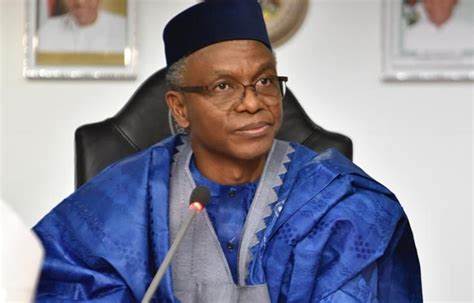A prominent All Progressives Congress chieftain in Kaduna State has issued a sharp warning to Nigerians against embracing former Governor Nasir El-Rufai’s criticism of the current federal administration, urging citizens to remember his controversial tenure as state governor.
Mallam Suleiman Salisu expressed strong disapproval of El-Rufai’s recent public statements criticizing President Bola Tinubu’s government, describing the former governor’s newfound role as a critic as hypocritical given his own record in office. Speaking in an interview with Daily Post, Salisu questioned why Nigerians appear to have forgotten El-Rufai’s eight-year performance as Kaduna State governor.
The APC leader specifically highlighted what he characterized as El-Rufai’s discriminatory approach to infrastructure development during his tenure, particularly regarding the treatment of Christian-dominated areas in southern Kaduna. “Go to the other part of Kaduna metropolis, the southern part of the city dominated by Christians. El-Rufai completely did nothing in the provision of infrastructure, construction of roads, and other social amenities as if they are not part of the metropolis,” Salisu stated.
Salisu also drew attention to the security challenges that plagued Kaduna State under El-Rufai’s leadership, questioning whether Nigerians had forgotten the surge in kidnapping incidents across the state. He painted a grim picture of the security situation during that period, asking rhetorically about the safety of traveling to various parts of the state.
“As Nigerians, have we all forgotten during the years of the former governor when kidnapping in all parts of the state became the order of the day? Are you talking of going to Birnin Gwari from Kaduna or are you talking of going to Kafanchan or Abuja? How many Nigerians were killed or kidnapped?” Salisu questioned, highlighting the deteriorating security environment under El-Rufai’s watch.
The APC chieftain specifically referenced violent incidents in Zangon Kataf Local Government Area, particularly in the Atyap Chiefdom, accusing the former governor of failing to provide meaningful solutions to communal conflicts. “Are you talking of many souls that were wasted in Zangon Kataf Local Government Area, particularly in Atyap Chiefdom, and the governor did nothing to provide tangible solutions to the people?” he asked.
Salisu expressed frustration with what he sees as selective memory among Nigerians who now view El-Rufai favorably despite his contentious record as governor. He suggested that the former governor’s current positioning as a critic of the federal government represents a calculated political move rather than genuine concern for national development.
“Today the former governor is everywhere speaking as a saint, condemning the present administration, and Nigerians believe that these are the type of politicians that want to come and take over the leadership of the country?” Salisu questioned, challenging the credibility of El-Rufai’s criticism given his own governance record.
The APC leader called on Nigerians to exercise greater discernment in evaluating political figures, particularly those seeking to position themselves as alternatives to current leadership. He argued that citizens should demand accountability from politicians based on their past performance rather than accepting their current rhetoric at face value.
Salisu’s comments reflect broader tensions within Nigeria’s political landscape, where former officials often become vocal critics of their successors while their own records remain subjects of debate. His warning suggests concern within some APC circles about El-Rufai’s growing influence as a political commentator.
The criticism comes amid ongoing national discussions about governance, security, and development, with various political figures offering competing narratives about Nigeria’s challenges and potential solutions. Salisu’s intervention represents an attempt to refocus attention on El-Rufai’s gubernatorial record as a measure of his credibility as a national political voice.
“What solution does El-Rufai and his people have to offer the country?” Salisu concluded, challenging the former governor to demonstrate concrete alternatives rather than simply criticizing existing leadership.



















